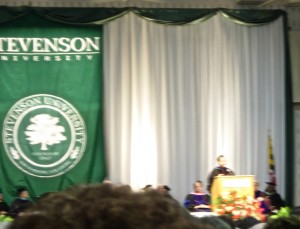 “I have to say, the exams I had to pass to earn an honorary degree aren’t nearly as tough as the ones you guys had to pass. I did have to write a 15 million page thesis, though. But luckily, other people wrote it for me,” jived Jimmy Wales yesterday as he took the podium in the gymnasium of Stevenson University in Baltimore, Maryland.
“I have to say, the exams I had to pass to earn an honorary degree aren’t nearly as tough as the ones you guys had to pass. I did have to write a 15 million page thesis, though. But luckily, other people wrote it for me,” jived Jimmy Wales yesterday as he took the podium in the gymnasium of Stevenson University in Baltimore, Maryland.
As keynote speaker in the 57th graduation ceremony for the small, liberal arts school, we expected Wales to lay some experiential wisdom on us, offer a metaphorical pat on the back, and leave us with inspirational insight as we embark on the harsh realities and unprecedented opportunities of the real world. You know, the typical graduation stuff.
“Luckily, the president just gave you that stuff. I’m a lot less fancy,” said Wales, as he adjusted the freshly bestowed hood and medal signifying his honorary doctorate degree from Stevenson. Less fancy? Yes. But inspirational, practical, relevant and entertaining? Definitely! The crowd loved him. And as a group of graduates in which many admit to be graduating only because of Wikipedia, we were compelled by his advice.
Listening to the stories of his numerous missteps, a few accidental successes, and a passionate, entrepreneurial spirit, I was comforted and inspired by what Wales has proven – the notion that one good idea that brings people together, built on social interaction and interdependence, can grow, and it can change the world. But also that failing is part of the process, and not every idea will make it big. Even Wikipedia guy has had some blunders.
Here’s what I learned about being successful from Jimmy Wales, the guy who changed how we see, use and interact with the Internet, and how we learn:
The BIG ideas don’t always work. He had three brilliant ideas. They all flopped. His first attempt at social revolution was trying to start an online food ordering system. The Internet service would connect downtown lunchers with area restaurants, and prevent the need for leaving the office during the lunch hour. It failed. Wales said restaurant owners looked at him like he was from Mars when he talked to them about the Internet in 1996. Continue reading







